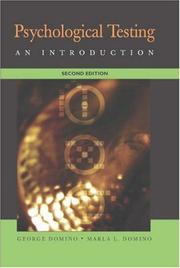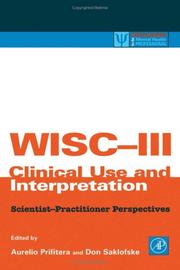| Listing 1 - 10 of 266 | << page >> |
Sort by
|
Book
ISBN: 0128024909 0128022191 9780128024904 9780128022191 Year: 2017 Publisher: London, England : Academic Press,
Abstract | Keywords | Export | Availability | Bookmark
 Loading...
Loading...Choose an application
- Reference Manager
- EndNote
- RefWorks (Direct export to RefWorks)
Psychometrics and Psychological Assessment: Principles and Applications reports on contemporary perspectives and models on psychological assessment and their corresponding measures. It highlights topics relevant to clinical and neuropsychological domains, including cognitive abilities, adaptive behavior, temperament, and psychopathology.Moreover, the book examines a series of standard as well as novel methods and instruments, along with their psychometric properties, recent meta-analytic studies, and their cross-cultural applications. Discusses psychometric issues and empirical studies that speak to same Explores the family context in relation to children's behavioral outcomes Features major personality measures as well as their cross cultural variations Identifies the importance of coping and resilience in assessing personality and psychopathology Examines precursors of aggression and violence for prediction and prevention
Psychological tests. --- Mental tests --- Psychological assessment --- Tests, Psychological --- Psychology --- Testing --- Clinical psychology --- Educational tests and measurements --- Methodology

ISBN: 0471554812 Year: 1985 Volume: vol *4 Publisher: New York Wiley
Abstract | Keywords | Export | Availability | Bookmark
 Loading...
Loading...Choose an application
- Reference Manager
- EndNote
- RefWorks (Direct export to RefWorks)
Psychiatry --- Examens psychologiques --- Mental tests --- Psychological assessment --- Psychological tests --- Psychologische tests --- Tests [Psychological ] --- Tests [Psychologische ] --- Sick --- Psychology --- Sick - Psychology. --- Psychological tests.
Periodical
ISSN: 22230955 Year: 2011 Publisher: Paris : OECD Publishing.
Abstract | Keywords | Export | Availability | Bookmark
 Loading...
Loading...Choose an application
- Reference Manager
- EndNote
- RefWorks (Direct export to RefWorks)
How can assessment and evaluation policies work together more effectively to improve student outcomes in primary and secondary schools? The country reports in this series analyse major issues facing evaluation and assessment policy to identify improvements that can be made to enhance the quality, equity and efficiency of school education.
Education --- Educational tests and measurements --- Educational assessment --- Educational measurements --- Mental tests --- Tests and measurements in education --- Psychological tests for children --- Psychometrics --- Students --- Examinations --- Psychological tests --- Rating of
Book
ISBN: 0128021101 0128020768 9780128021101 9780128020760 Year: 2016 Publisher: Amsterdam, [Netherlands] : Academic Press,
Abstract | Keywords | Export | Availability | Bookmark
 Loading...
Loading...Choose an application
- Reference Manager
- EndNote
- RefWorks (Direct export to RefWorks)
"WJ IV Clinical Use and Interpretation: Scientist-Practitioner Perspectives provides clinical use and interpretive information for clinical practitioners using the Woodcock-Johnson, Fourth Edition (WJ IV). The book discusses how the cognitive, achievement, and oral language batteries are organized, a description of their specific content, a brief review of their psychometric properties, and best practices in interpreting scores on the WJ IV. Coverage includes the predictive validity of its lower order factors and the clinical information that can be derived from its 60 individual subtests. Part II of this book describes the clinical and diagnostic utility of the WJ IV with young children for diagnosing learning disabilities in both school age and adult populations, and for identifying gifted and talented individuals. Additionally, the book discusses the use of the WJ IV with individuals whose culture and language backgrounds differ from those who are native English speakers and who were born and raised in mainstream US culture"--Provided by publisher.
Woodcock-Johnson Tests of Cognitive Ability. --- WJTCA (Psychology) --- Cognition --- Intelligence tests --- Testing --- Intelligence levels --- Intelligence testing --- IQ tests --- Mental tests --- Psychological tests
Periodical
ISSN: 23338504 Year: 1948 Publisher: Princeton, New Jersey : Hoboken, NJ : Educational Testing Service John Wiley & Sons
Abstract | Keywords | Export | Availability | Bookmark
 Loading...
Loading...Choose an application
- Reference Manager
- EndNote
- RefWorks (Direct export to RefWorks)
Educational tests and measurements --- Collected works. --- Educational assessment --- Educational measurements --- Mental tests --- Tests and measurements in education --- Psychological tests for children --- Psychometrics --- Students --- Examinations --- Psychological tests --- Rating of
Book
ISBN: 9789264255449 Year: 2016 Publisher: Paris : OECD Publishing,
Abstract | Keywords | Export | Availability | Bookmark
 Loading...
Loading...Choose an application
- Reference Manager
- EndNote
- RefWorks (Direct export to RefWorks)
This report reviews the collection, availability and quality of system-level data and metadata on education from countries participating in the PISA for Development project: Cambodia, Ecuador, Guatemala, Paraguay, Senegal and Zambia. PISA for Development aims to increase low income countries’ use of PISA assessments for monitoring progress towards national goals for improving education and for analysing the factors associated with student learning outcomes, particularly among poor and marginalised populations. The project also helps track progress towards the international education targets defined in the Education 2030 Framework for Action, which the international community adopted in 2015 as the strategy for achieving the Education Sustainable Development Goal (SDG). The report suggests technically sound and viable options for improving data quality, completeness and international comparability in the six countries that are reviewed. It also provides insights into overcoming some of the challenges common to countries that participate in PISA for Development and to other middle income and low income countries.
Educational tests and measurements --- Educational assessment --- Educational measurements --- Mental tests --- Tests and measurements in education --- Psychological tests for children --- Psychometrics --- Students --- Examinations --- Psychological tests --- Rating of
Book
ISBN: 9780521861212 0521861217 9780511575907 9781107423558 9780511517853 0511517858 0511575904 0511515324 9780511515323 110719654X 1107423554 1282103806 9786612103803 051151431X 0511516606 051151736X Year: 2009 Publisher: Cambridge [England] New York Cambridge University Press
Abstract | Keywords | Export | Availability | Bookmark
 Loading...
Loading...Choose an application
- Reference Manager
- EndNote
- RefWorks (Direct export to RefWorks)
The field of intelligence testing has been revolutionized by Alan S. Kaufman. He developed the Wechsler Intelligence Scale for Children's Revised (WISC-R) with David Wechsler, and his best-selling book, Intelligent Testing with the WISC-R, introduced the phrase 'intelligent testing'. Kaufman, with his wife, Nadeen, then created his own series of tests: the Kaufman Assessment Battery for Children (K-ABC), the Kaufman Test of Educational Achievement (K-TEA), the Kaufman Brief Intelligence Test (K-BIT), and many others. The K-ABC, the first major intelligence test to challenge the Wechsler, helped raise the bar for future tests. This is a celebration of his life's work, with contributions by a 'who's who' in IQ testing, including Bruce Bracken, Dawn Flanagan, Elaine Fletcher-Janzen, Randy Kamphaus, Nancy Mather, Steve McCallum, Jack Naglieri, Tom Oakland, Cecil Reynolds, and Robert Sternberg, is edited by his son James, and features essays expanding on his work and ideas from former colleagues.
Intelligence tests. --- Kaufman, Alan S., --- Intelligence levels --- Intelligence testing --- IQ tests --- Mental tests --- Psychological tests --- Testing --- Kaufman, Alan S. --- Health Sciences --- Psychiatry & Psychology

ISBN: 9780511813757 9780521861816 051121944X 9780511219443 0521861810 9780511648342 0511648340 0511813759 9780511220128 051122012X 051135164X 9780511351648 1107168317 9781107168312 1316099520 9781316099520 1280956232 9781280956232 0511569068 9780511569067 Year: 2006 Publisher: Cambridge New York Cambridge University Press
Abstract | Keywords | Export | Availability | Bookmark
 Loading...
Loading...Choose an application
- Reference Manager
- EndNote
- RefWorks (Direct export to RefWorks)
This book is an introductory text to the field of psychological testing primarily suitable for undergraduate students in psychology, education, business, and related fields. This book will also be of interest to graduate students who have not had a prior exposure to psychological testing and to professionals such as lawyers who need to consult a useful source. Psychological Testing is clearly written, well-organized, comprehensive, and replete with illustrative materials. In addition to the basic topics, the text covers in detail topics that are often neglected by other texts such as cross-cultural testing, the issue of faking tests, the impact of computers and the use of tests to assess positive behaviors such as creativity.
Psychological tests --- Psychology --- Mental tests --- Psychological assessment --- Tests, Psychological --- Testing --- Clinical psychology --- Educational tests and measurements --- Methodology. --- Methodology --- Health Sciences --- Psychiatry & Psychology

ISBN: 9780125649308 0125649304 9780080521206 0080521207 9786610927364 1280927364 Year: 1998 Publisher: San Diego Academic Press
Abstract | Keywords | Export | Availability | Bookmark
 Loading...
Loading...Choose an application
- Reference Manager
- EndNote
- RefWorks (Direct export to RefWorks)
The WISC-III is the most frequently used IQ assessment technique in the United States. This book discusses the clinical use of the WISC-III with respect to specific clinical populations, and covers research findings on the validity and reliability of the test. It also includes standardization data from the Psychological Corporation. Many of the contributors participated in the development of the WISC-III and are in a unique position to discuss the clinical uses of this measure. The book describes the WISC-III from scientist-practitioner perspectives. It provides methods to aid in understan
Wechsler Intelligence Scale for Children. --- Intelligence tests --- Intelligence levels --- Intelligence testing --- IQ tests --- Mental tests --- Psychological tests --- WISC (Intelligence test) --- Children --- Testing
Book
ISBN: 1787357244 1787357252 Year: 2022 Publisher: London : UCL Press,
Abstract | Keywords | Export | Availability | Bookmark
 Loading...
Loading...Choose an application
- Reference Manager
- EndNote
- RefWorks (Direct export to RefWorks)
Educational assessment is important. But in the twenty-first century it is easy to feel that schooling and other phases of education are shaped entirely by certain assessments, and that assessment is only about exam results. The idea that test grades can accurately describe the aims and outcomes of education is unfair and reductive. Yet it is a pervasive and persuasive discourse. This book is about such discourses - the stories we tell each other - and how they impact public trust and confidence in educational assessment. It explains the roots and nature of assessment discourses, and proposes a restructuring of the debates in order to rebuild public confidence. It aims to challenge dominant assessment discourses and demands a more nuanced, informed debate about what happens in and beyond schools, and how this influences public thinking. Questioning the status quo needs buy-in from policymakers, teachers, parents and students, and from the broader public: from journalists, you, me, our friends and our children. Using examples from international settings to explore the nature of trust in assessment discourses, Rebuilding Public Confidence in Educational Assessment shows how these discourses can be reframed so that all aspects of the assessment system - policymaking, school planning, home practice with students - can be undertaken with confidence.
Educational tests and measurements. --- Educational assessment --- Educational measurements --- Mental tests --- Tests and measurements in education --- Psychological tests for children --- Psychometrics --- Students --- Examinations --- Psychological tests --- Rating of
| Listing 1 - 10 of 266 | << page >> |
Sort by
|

 Search
Search Feedback
Feedback About UniCat
About UniCat  Help
Help News
News